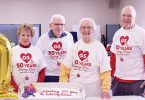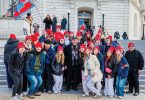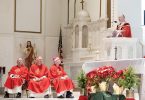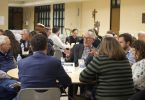
by Maggie MacFarland Phillips
Special to The Leaven
LEAVENWORTH — The numbers are going up all around the country. And Leavenworth is no exception — it is seeing both an increase in people experiencing chronic homelessness and an increase in unsheltered populations.
Myranda Agnew is the new director at Leavenworth’s Interfaith Community of Hope, which serves county residents experiencing poverty and homelessness. But it is not necessarily Leavenworth residents who are contributing to the rising numbers.
She said individuals are coming to them from California, Texas and Nebraska. Often, she explained, someone has abandoned them after taking advantage of them, and quite a few are simply dropped off at the gates of Fort Leavenworth.
“And they just end up wandering,” she said.

The city is meeting the local effects of this nationwide problem with true communitywide solutions, as public, private and religious groups working together to shelter those who go without.
Finding a way to help these individuals return home is one of many difficulties Agnew confronts at Community of Hope. Since the pandemic, those difficulties have also included an increase in female guests and families showing up at their night shelter.
There is, she said, “a lot of problem-solving.”
But Agnew is a happy warrior, uncowed by the challenges of serving the marginalized during a once-in-a-century pandemic.
Having recently taken over from Interfaith founder Sister Vicki Perkins, SCL (“huge shoes to fill,” Agnew effuses), she brings to her new position a bachelor’s degree in management and human resources, an MBA from Webster University in St. Louis and 14 years’ experience as director of human resources for Leavenworth city schools.
‘Whatever you have for me’
A few years ago, Agnew says she and her husband “felt the God pull” to make some professional changes in their lives. Inspired by her husband’s decision to leave the field of education for a job as worship leader at a local church, she overcame her initial reservations about leaving behind the stability of her own career to pursue God’s will for her life — whatever that might be.
“All right, God, whatever you have for me,” she remembered thinking, “not really knowing that there really was something.”

Then, last year, after assisting with Community of Hope’s fundraiser in a volunteer capacity, she was approached by Sister Vicki about taking over the shelter.
Agnew has found her HR skills are well-suited to Community of Hope’s operations. She sees parallels between her work in education and her new vocation — she said the schools’ emphasis on restorative justice and faculty training on dealing with students experiencing poverty have been particularly helpful.
Fully community sponsored in every sense
When Agnew characterized the way community support has buoyed Community of Hope — both before and during the pandemic — the reasons for her hope become evident.
Community of Hope volunteer and Army veteran Rolly Dessert described a spirit of ecumenical cooperation that initially brought together Leavenworth, Lansing and Fort Leavenworth Christian churches. He said they were committed to concretely answering a question: “How should we address problems of poverty?”
This unity in support of a clear goal is what gave birth to Interfaith Community of Hope, which opened in 2018 with a debt-free building fully funded through community donations.
Night shift volunteer stalwart John Nelson also attributed the organization’s success to Sister Vicki’s leadership and the disparate communities’ continued work together.
“I would say that it is certainly a model for interfaith cooperation,” Nelson said.

It’s a model of secular cooperation, too. Agnew described a robust relationship with the Leavenworth County Health Department, who contacted her office in mid-February, letting her know there were extra vaccines. By mid-March, her team was fully vaccinated and the health department called again to arrange a visit to the shelter to vaccinate around a dozen guests.
Today, Community of Hope now has a rule that guests must be vaccinated to use the day shelter, where social distancing is difficult and guests unmask to eat. Both Agnew and the health department described diligent vaccine participation among Community of Hope guests.
Community of Hope is maintained and grown through regular community member donations, local government grants and cooperation from behavioral health care service provider The Guidance Center.
Agnew is pursuing grants and assistance for future projects, including improved access to fresh water (currently, due to an absence of any public fountains, individuals experiencing homelessness in the city of Leavenworth get water from the Missouri River); expanded access to laundry and shower facilities; and material outreach capabilities for unhoused individuals who will not visit Community of Hope for a number of reasons.
Another ongoing effort is bringing in an on-site social worker to serve as a case manager. Volunteers currently work as case managers to help Community of Hope guests secure the necessary items to get a job or even benefits. Many individuals experiencing homelessness do not have identification, making job searches and qualifying for benefits difficult. Getting new identification can be even harder without a birth certificate, which some people experiencing homelessness and unhoused persons lack.
When talking about her organization, Agnew used the word “amazing” a lot. She applied the adjective to the center’s volunteers as well as her team of paid employees. Agnew said it takes 70 volunteers a week to efficiently run the center’s day and night shelters (two distinct entities on either side of the building, open at separate times).
As a result of the pandemic, their volunteer numbers dwindled from 250 strong prior to March 2020, down to 50 at one point. While positions of all kinds remain vacant, volunteers are beginning to return.
Selfless service
One of the things that sets Leavenworth apart is the Army post in its midst. Many Community of Hope volunteers are retired military or military. Nelson and Dessert both ascribe the Army value of “selfless service” to their continued willingness to serve the vulnerable in their community.
So, is the Leavenworth model replicable elsewhere?
Dessert thinks so.
“While I think we are a unique community,” he said, “I also think that the Gospel will inspire any group of faithful people to achieve cooperation around a task that will help the community.”






